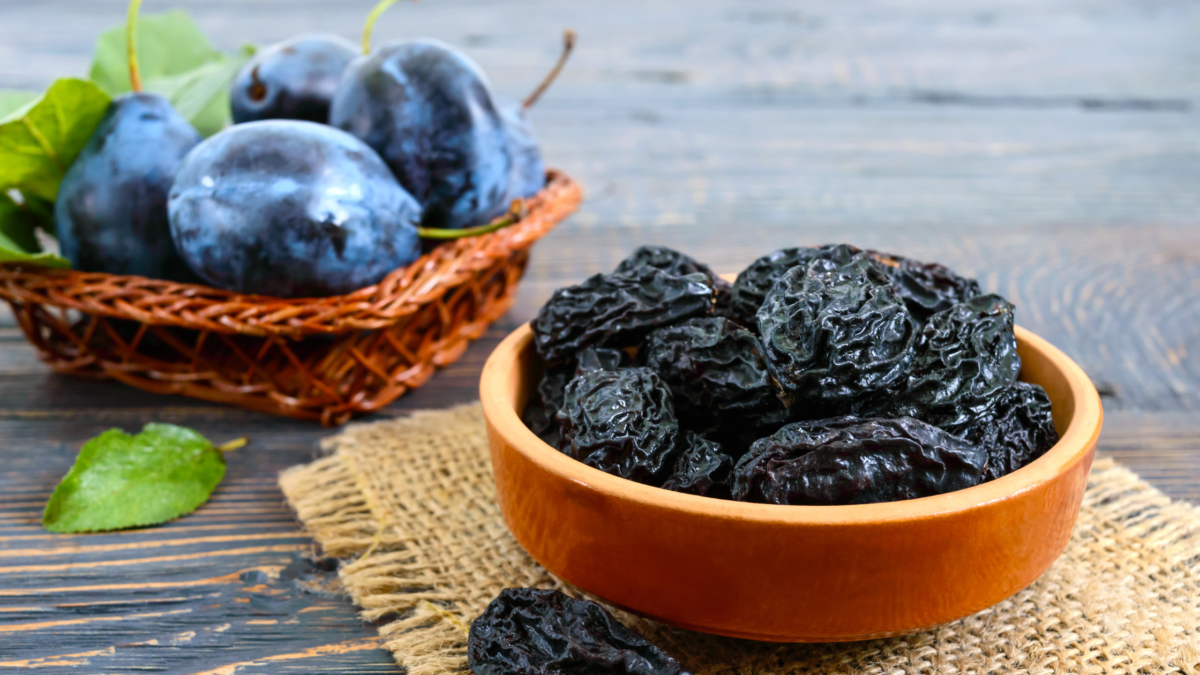


Medically Reviewed By Margaret Etudo. Written By The Vitamins For Woman Team.
Do you know that your diet could be the key to healthier bones? Find out how prunes play a role in strengthening your bones.


medically reviewed by margaret etudo, BPharm. written by the vitamins for woman team.
Prunes are simply dried plums from the European plum variety known as Prunus domestica. These sweet, chewy fruits are not only a delicious snack but are packed with vitamins, minerals, and antioxidants that contribute to overall well-being such as digestion, bone metabolism and support skeletal health. Understanding the benefits of prunes and its effect on bones is very important for women who are at a high risk for osteoporosis.
The relationship between prunes and bone health isn’t just a myth or folk wisdom but this has been proven scientifically. We will now see below how the nutrients in prunes positively affect bone health. They are particularly noted for their high content of the following nutrients:
They work together to create a helpful environment for bone formation and reduce bone breakdown. Prune intake is thus beneficial for maintaining skeletal health and bone density.
Osteoporosis is a condition that weakens bones. It is a major concern for postmenopausal women. Hormonal changes reduce estrogen. This affects bone density and causes bone loss. Prunes can improve bone health in the following ways:
Prunes offers a variety of health benefits but consuming them in excess can lead to the following:
There is Clinical Evidence that has strongly proven that prunes’ has the ability to improve bone density. Consuming it regularly helps prevent the loss of bone mass associated with postmenopause (aging) and conditions like osteoporosis. The mechanism behind this effect is said to be multifaceted— prunes increases bone mineral density in spine and hip regions, it reduces bone turnover markers and enhances bone strength parameters. All of these are particularly notable in postmenopausal women who are at high risk for bone density loss.
The daily recommended intake of prunes varies. It depends on personal health goals. But experts recommend that consuming about 5 to 10 prunes per day may be beneficial for bone health. This amount provides enough of the key nutrients without excessive caloric intake.
For those preventing osteoporosis, add this to a balanced diet for better results. To stay healthy, pair prunes with other calcium-rich foods. Also, if you intend to juice, limit the intake to 4-8 ounces daily, as it contains concentrated sugar. But always consult a healthcare provider for a more appropriate amount.
The effects of prunes on digestion are almost immediately due to their fibre and sorbitol content. Their effects on bone health however is gradual. Regular consumption over time is essential for achieving great results related to bone density and general health needs.
Figs and prunes are good for bones. Prunes have more vitamin K and boron. They are better for building and maintaining strong bones.
Yes, prunes can help lower cholesterol levels due to their soluble fiber content. This can boost heart health and support metabolism. They’re good for healthy bones. This makes prunes a heart-healthy choice while supporting bone health.
Eating prunes daily can help your bone health. This is important if you’re at risk for osteoporosis. Their rich nutrients and proven benefits merit a spot for these dried fruits in your pantry.
Prunes are a tasty, effective snack for your bones. Enjoy them as a snack, in smoothies, or in baked goods. As always, moderation is key. Combine them with a balanced diet and an active lifestyle for better results.
As you think about adding prunes to your routine, listen to your body. If you worry about your diet or health, you should consult a doctor. By improving your diet and lifestyle, you can boost your bone health and well-being.
Arjmandi BH, Johnson SA, Pourafshar S, et al. 2017;9(5):496. Bone-protective effects of dried plum in postmenopausal women: efficacy and possible mechanisms. Nutrients.
Hooshmand S, Kern M, Metti D, et al. 2016;27(7):2271-2279. The effect of two doses of dried plum on bone density and bone biomarkers in osteopenic postmenopausal women: a randomized, controlled trial. Osteoporosis International.
Wallace TC. 2017;9(4):401. Dried plums, prunes and bone health: A comprehensive review. Nutrients.
Rendina E, Hembree KD, Davis MR, et al. 2013;8(3):e60569. Dried plum’s unique capacity to reverse bone loss and alter bone metabolism in postmenopausal osteoporosis model. PLoS One.
Smith BJ, Bu SY, Wang Y, et al. 2014;58:151-159. A comparative study of the bone metabolic response to dried plum supplementation and PTH treatment in adult, osteopenic ovariectomized rat. Bone.
Hooshmand S, Arjmandi BH. 2009;8(2):122-127. Viewpoint: dried plum, an emerging functional food that may effectively improve bone health. Ageing Research Reviews.
Arjmandi BH, Khalil DA, Lucas EA, et al. 2002;11(1):61-68. Dried plums improve indices of bone formation in postmenopausal women. Journal of Women’s Health & Gender-Based Medicine.
Lever E, Cole J, Scott SM, et al. 2014;40(7):750-758. Systematic review: the effect of prunes on gastrointestinal function. Alimentary Pharmacology & Therapeutics.
Stacewicz-Sapuntzakis M. 2013;53(12):1277-1302. Dried plums and their products: composition and health effects–an updated review. Critical Reviews in Food Science and Nutrition.
Can you be more specific about the content of your article? After reading it, I still have some doubts. Hope you can help me.
Your article helped me a lot, is there any more related content? Thanks!
I don’t think the title of your article matches the content lol. Just kidding, mainly because I had some doubts after reading the article.
Your article helped me a lot, is there any more related content? Thanks!
Thank you for your sharing. I am worried that I lack creative ideas. It is your article that makes me full of hope. Thank you. But, I have a question, can you help me?
Your article helped me a lot, is there any more related content? Thanks!